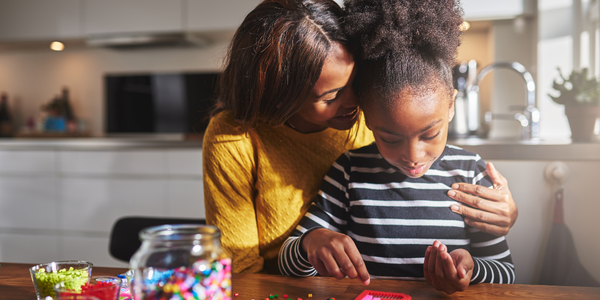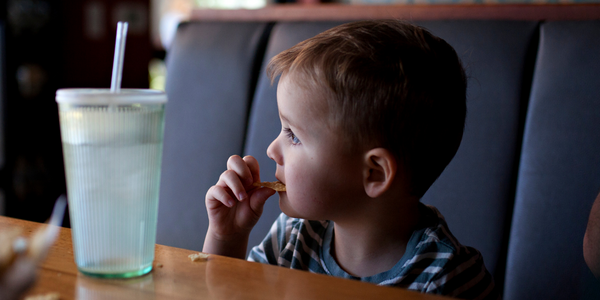
Having sensory sensitive, ADHD children has taught me to prepare for every scenario; at least every scenario that I can possibly conceive. Though Bubs is doing so much better about handling the environment around him, there is still need for us to prepare him for new and different situations. And Little Man continues to struggle staying in control. Holiday get-togethers can bring out an ugly side of our family.
With unusual schedules, groups of people, and random bedtimes, the holidays are rough times for all children (and adults). But those with Sensory Processing Disorder, Autism, and ADHD really struggle. These kiddos don’t know how to handle all of the activity which can quickly lead to the day spiraling out of control.
So, what do you do to make this time of year successful for your child and everyone else?
Prepare the child (and yourself) for what is going to take place – the good, the bad, and the ugly.
Here are a few tips that we have learned along the way. Most of them after the fact!

Don’t allow the child to get overtired.
Know when enough is enough. Don’t try to draw out one more {blank}. When the child is emotionally and physically done it is best for everyone that you call the activity or day over. A few years ago, we were especially vigilant on this point. Full, active days promised night terrors for Bubs. So, we made sure that a long day incorporated quiet, peaceful times to allow is body time to refresh. This could include a bath, reading books, Legos, coloring, etc.
Keep to a regular bed schedule.
This goes hand in hand with #1. With all of the extra activities, it is especially important for your child to get plenty of down time and sleep. When children are overtired, meltdowns are more likely to occur.
With Sensory Processing Disorder, these meltdowns can be ugly and last a long time. But no matter if they last two or 90 minutes, no one wants to endure this during the holidays. So, help your child get the sleep he/she needs.
Provide your child with a space to go when overloaded.
We created a small, quiet area for Bubs that he knew was his safe place. (A tent or an area in a closet works great.) Included in the space were Legos, books, coloring items, and puzzles for him to relax and have some down time. We trained him to sense his body’s need for peace and to ask to go there when he felt overloaded with the activities. If we are visiting another home, one of us will pull him aside to do a quiet, one-on-one activity – read a book, cook in the kitchen, play a quiet game – to calm him down. When to stay for several days at someone’s home, we designate a safe place for him to use.

Be realistic in what your child can do.
Don’t ask your child to do something during the holidays that you wouldn’t normally ask them to do. We used to try and get Bubs to nap during holidays. While a nap may be what he needed, we learned that trying to force sleep on him didn’t work because he was too tired and could not calm his body down. We had to realize having quiet time is all that Bubs was capable of doing. And quiet time was still refreshing for his little body.
Explain, explain, explain.
Holiday parties and crowded restaurants can be overwhelming. Explain (to the best of your ability) what is going to occur. If When plans change, pull the child close so that you can help him/her grasp that alterations. You can discuss the changes and help answer any questions. Keep these conversations in private as much as possible to keep the child at ease. Show pictures of the people your child will see and remind the child of their names along with pertinent information.
Be specific about restaurant expectations.
Before leaving for the restaurant allow the child to choose from a select number of toys to take along to play with. Explain that the chosen toy is what will be quietly played with at the restaurant. Do not give the child the toy until you are seated in the restaurant. Also, before arriving, discuss with the child where he/she will sit, behavior expectations, food options, etc. Always set the child by you so that you can whisper encouraging comments or rub the child’s back (if this is a calming technique that works). If possible, on the other side of the child set a calm person.
Keep your child at arms distance.
Little Man and Bubs feed off of excitement. What may be a little bit of excitement for some children is a lot for them. This makes it very difficult for them to come back down. When in high-energy atmospheres, Daddy or I keep the boys at very close reach. This way, we can immediately stifle any escalating situation. Most of the time, this is not a form of discipline but simply to pull them away and redirect them to a calmer scenario.

Christmas: Prepare for Gift Opening
I learned this one the hard way. Assuming that my children would always be grateful for whatever they received, I never thought to prepare them for unwanted gifts. Bad news! Now, before the activity begins, we talk about appropriate ways to handle gifts they like and gifts they do not like. We run scenarios of what to say and how to find something positive in even the “worst” gift (in their eyes). The kids have learned to find one attribute that they can be thankful for without lying – the color, the size, the texture, etc.
Know calming techniques that work and those that don’t work.
For Bubs and Little Man, rubbing their backs help them calm down. In contrast, we learned very quickly that holding Bubs close puts him into “fight or flight” mode. If a certain toy or item calms your child, be sure to have it with you for emergency situations. Another technique is to quickly remove the child from the situation. This can help squelch an escalating disaster.
Prepare for different foods.
During the holidays kids are asked to eat different foods than what they may be used to. In our home, our children must try at least one bite of every food option. Sometimes these battles can be a little ugly. This rule is off during the holidays. Remember, holidays are not the time to work on expanding a child’s food palate. Train the child to know what to do or say when asked to eat something that they don’t like.

When adults are talking…
Children can learn not to interrupt adults. Teach your child(ren) to place a hand on you if you are talking or listening to another person. Then the child should wait to be spoken to. Once I feel my child’s hand on me, I simply put my hand on their hand to let them know that I see them waiting patiently. Then when a break in the conversation occurs, I can listen to their needs. More ideas in our “Children Who Interrupt” post.
Be proactive.
Error on the side of too much preparation rather than assume that the guidance will not be needed. Practice and role play situations that may occur. Gift giving, proper mealtime etiquette, and sharing may be great topics to start.
Be respectful of hosts and guests.
Training occurs at home, in a safe atmosphere. (I cannot emphasize this one enough!) Although expectations and boundaries need to be firm whether at home or away, a little grace may need to occur out of respect for everyone present. As explained with new foods, holiday get-togethers are not the time to make your child sit at the table for two hours until his/her plate is clean. Leave this type of training for another day. Also, if discipline or redirection needs to occur, pull the child aside and handle the situation in a private conversation. Be respectful. No one wants to listen to a child scream or watch a child be disciplined.
If your child has special food or other needs, bring the items with you and don’t expect the host to cater just to you.
One more point. Accidents happen but full on potty training doesn’t need to occur at someone else’s home. Be sure to put a diaper or training pants over underwear if the child is not fully potty trained to limit the stress of an accident.

Set realistic expectations of your child and praise him/her for appropriate behavior.
You have learned situations in which your child can succeed. You have also learned situations that almost promise a meltdown. We have to be our child’s advocate. Sometimes this means telling family that you won’t be able to participate in a full day of activities. Instead attend part of the day. And never forget the power of a sincere compliment.
Set realistic expectations of your spouse.
Once around family, I raise the bar of expectations on my husband. Suddenly he is to read my mind and match my level of perfection. This can lead to a lot of frustration, all of which is detrimental to the kiddos who need us. It is vital that we discuss expectations before we arrive at a family gathering so that we are on the same page. We talk about what behavior will be allowed from the children, how we will handle naps, areas where grace will be given, and a basic leave time. A united front helps the child know that the boundaries are firm and that they are safe.
Set realistic expectations of others (including family members or in-laws).
Most people will not understand what it is like to raise a child with special needs. They cannot fathom the emotional and physical drain. And the huge milestones that your child hits will appear elementary in their eyes. And people will say really dumb things out of ignorance.
Honestly, this is a hard one for me. I get frustrated over the “you didn’t do enough ____” or “you should have _____” comments. All of their solutions and instruction on how we did it wrong can send my blood pressure into unhealthy levels. But God is helping me to let these statements roll off my back. I am learning to focus on who I am in Christ and God’s love for me.
Part of being your child’s advocate is bridging the gap with family members who care. This may mean making a pre-phone call to explain the current situation. I have done this several times with my family to help them understand what we need to make the holidays successful for my boys. Typically, this includes the importance of quiet time, routine bedtime, and establishing a safe place for the boys if they need to gain control.
Set realistic expectations for yourself.
I have expectations of how my child will represent our family. But my children aren’t perfect. And even with the best intentions and preparations, things will still go wrong. In order for me to handle these surprises, I have to be at my best. This includes getting the sleep, nutrition, and exercise that I need. Secondly, I have to leave my pride at the door and do what is best for my children and not handle situations on what adults around me believe I should do.
I wish that I could say that we have mastered all seventeen of these tips. But we are still learning. Thank God that we have the Holy Spirit to give us wisdom and that we have a gracious God.

What tips have you learned to prepare your child for the holidays?

Thanks for the great tips! My DS just got diagnosed with SPD and his nickname is Bubs too!
Glad that you enjoyed the tips!
Very good information!
Thank you for that!!! Good for all kids, not just the special needs ones!
We often just think our kids know what is going on and what is expected of them and have cross communications and unfulfilled expectations which lead to frustration.
So true, so true. I pray that these tips will help many, many families.